
THE VOICE OF INTERNATIONAL LITHUANIA
|
VilNews has its own Google archive! Type a word in the above search box to find any article.
You can also follow us on Facebook. We have two different pages. Click to open and join.
|
News
- Posted by - (0) Comment

Darius Kuolys, 50, was the first culture and education minister of the re-established independent state of Lithuania, back in 1990-1992 – then he was still in his twenties. Now Kuolys is professor of the history of literature in Vilnius University. In 1988, during the Soviet occupation, he and his friends started issuing, illegally, their underground cultural magazine Sietynas. From 1998-2002 he was an adviser to Lithuanian President Valdas Adamkus. Kuolys is an active participant in the liberal organization Santara-Sviesa, which was created by Lithuanian-American intellectuals in the U.S. in 1957. The organization, which is mostly known for its public intellectual discussions, moved to Lithuania in the 1990s.
Kuolys is known as a human rights activist. He publicly expressed his doubts about the guilt of Egle Kusaite, a 23 year-old convert to Islam who was accused by Lithuanian prosecutors of having terrorist intentions in Russia. Kusaite’s case is still pending in the courts.
This activist is famous as one of the organizers of several protest demonstrations which took place on Vilnius streets and squares this year, to support the demand for justice in the so-called Garliava case. The crime story, which can alter the Lithuanian political landscape after the parliamentary elections in the coming October, is well known by everybody in Lithuania. On Oct. 5, 2009, Drasius Kedys, 37, who said his young daughter had been the victim of pedophiles (including businessman Andrius Usas), gunned down (according to prosecutors’ suggestions, which were never confirmed in court) a Kaunas judge, Jonas Furmanavicius, and Violeta Naruseviciene, who was the aunt of Kedys’ daughter (her mother’s sister). Neringa Venckiene, who is the sister of the deceased Kedys, says that she does not believe that her brother was the killer.
- Bookmark :
- Digg
- del.icio.us
- Stumbleupon
- Redit it
- Posted by - (0) Comment

The Men’s Basketball at the 2012 London Olympics tips off on Sunday, July 29, as 144 players on 12 teams from around the globe begin their quest for gold, ending with the Finals on Sunday, August 12.
Men’s Basketball was first introduced at the 1936 Games in Berlin and things were forever changed in Barcelona, when professional players were permitted to compete in the 1992 Olympics.
The 12 teams are broken up into two groups, with the top four teams in each group advancing to the quarterfinals, as the tournament shifts from the preliminary round to the knockout stage.
Group A :
· Argentina,
· France,
· Lithuania,
· Nigeria,
· Tunisia,
· United States
- Bookmark :
- Digg
- del.icio.us
- Stumbleupon
- Redit it
- Posted by - (0) Comment
Chinese tourists have discovered Lithuania!

In tiny Lithuania (which is not exactly Europe’s #1 tourist destination), there are droves of Chinese tourists running around the city.
- Bookmark :
- Digg
- del.icio.us
- Stumbleupon
- Redit it
Record-breaking first half of the year at Vilnius Airport: June – the best in history
- Posted by - (0) Comment
![]()

The passenger traffic at Vilnius International Airport (VIA) has shown a steady upward trend since the previous year, and the result of June this year was the best throughout all years of the airport’s operation.
In June 2012, the airport handled 228.6 thousand passengers, which surpassed the result of June 2011 by 23%. Until now, the best monthly result was achieved in August 2008, when the number of passengers soared to 224.6 thousand. 2,775 flights were operated in the first summer month, showing a 7% growth.
The growth in regular flights accounted for 25%, while charter flights witnessed a 15% increase. The most popular June destinations were London, Frankfurt, Riga, Antalya, Copenhagen and Moscow.
971 thousand passengers were handled in six months this year, showing a 36% growth in passenger numbers compared to the same period in 2011.
“The successful results of the first half of the year reached the peak on 15 June, when Vilnius Airport beat the record of the passengers handled in one day: 4,498 passengers departed from Vilnius Airport and 4,530 passengers arrived at Vilnius Airport, totalling 9,028 passengers handled by the airport,” Tomas Vaišvila, VIA Managing Director, commented the results. “Most passengers arrived from Riga – 371, while the number of departing passengers was the highest on London route – 490. A large part of passengers – 1834 – travelled to holiday destinations – Sicily, Cyprus, Turkey, and Greece.”
Until now, the highest number of passengers handled in one day was 8,682 passengers on 17 August 2008.
In 2007 Vilnius Airport handled 1,717 million passengers, 2,048 million in 2008, 1,308 million in 2009, 1,373 million in 2010, and 1,715 million in 2011. It is expected to reach a 25% growth in passenger traffic in 2012. 20 airlines operate regular flights from Vilnius Airport on as many as 39 direct routes.
- Bookmark :
- Digg
- del.icio.us
- Stumbleupon
- Redit it
- Posted by - (0) Comment
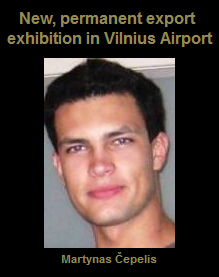
This September a new permanent exhibition for business – EXPO Center of Lithuanian Enterprises – will open its doors to passengers at Vilnius International Airport (VIA), which will be available to every departing passenger after completing aviation security screening procedures.
Situated next to the Business Lounge of Vilnius Airport, EXPO Center will provide Lithuanian enterprises with an opportunity to present their activities, thus enhancing their recognition in Lithuania and presenting themselves to foreign guests.¨
Having thoroughly acquainted with a good or service on display, professional consultants working at EXPO Center will seek potential partners and useful contacts for the enterprises showcasing themselves in the exhibition. It is the first service to business of this type in the country.
“To find foreign partners, Lithuanian entrepreneurs often choose a traditional way – to attend exhibitions abroad. Our idea is to open an exhibition at home, at Vilnius Airport, witnessing a great number of departing and arriving Lithuanian and foreign entrepreneurs. What is more, the foreigners who have already visited Lithuania and got familiar with the country and culture are more prone to develop their business relations with local business representatives. The EXPO Center will contribute to a more active entrance of Lithuanian enterprises to new export markets and ensure the spread of contacts in the best interest of businesses,” says Martynas Čepelis, Director of EXPO Center.
The passenger traffic shows a steady upward trend at Vilnius Airport. It is expected to handle 2.15 million passengers this year and 2.5 million passengers in 2013. According to the data available at the airport, as many as 46 percent of passengers travel on business purposes.
“We believe that the EXPO Center will not only be of great use and interest to entrepreneurs but also to every airport passenger. The exhibition will present Lithuania as a country providing top-quality products and high added-value services and will give an opportunity to foreign entrepreneurs to discover new business ideas and to establish useful contacts,” says Simonas Bartkus, Director of Commerce Department at Vilnius International Airport.
Some 70 companies from varying Lithuanian businesses and industrial sectors will have a chance to display their goods and services in the EXPO Center exposition at a time. It is estimated that 10-15 thousand people could visit it in a month.
- Bookmark :
- Digg
- del.icio.us
- Stumbleupon
- Redit it
- Posted by - (0) Comment
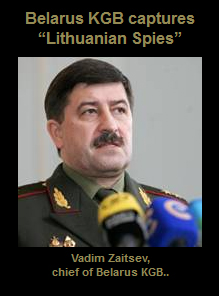
The alleged spies face
7 to 15 years in prison.
Authorities in Belarus say they have arrested an undisclosed number of people accused of spying on behalf of Lithuania.
The ex-Soviet nation's top security agency, which is still known as the KGB, said Thursday that the arrested individuals are Belarussian nationals who have already confessed to trying to obtain defense and security information about Belarus and Russia.
Lithuanian foreign ministry spokesman Mindaugas Lasas was quoted by the RIA Novosti agency as saying that the allegations were "not true."
Since 1994, Belarus has been ruled by authoritarian President Alexander Lukashenko. Over the years, his government has arrested and imprisoned dozens of opposition activists, government critics and journalists.
Belarus has often accused Lithuania, which is part of the European Union, of supporting Lukashenko's opponents.
“All those arrested are citizens of Belarus,” Artur Strekh, a deputy head of the KGB’s information and public relations department, said
- Bookmark :
- Digg
- del.icio.us
- Stumbleupon
- Redit it
- Posted by - (0) Comment
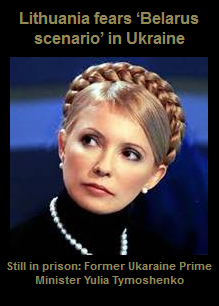
Russia regaining influence over the is possible in Ukraine
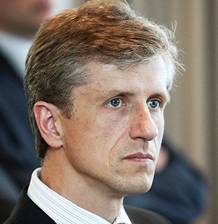
Darius Semaška
If the EU plays its cards badly, a "Belarus scenario" in which Russia would regain influence over the former Soviet Republic is possible in Ukraine, Darius Semaška, a chief government advisor for Lithuania, told journalists yesterday (10 July). EurActiv reports from Vilnius.
“Unfortunately, the developments in Ukraine are not those that we wanted to see,” Semaška said, speaking to a small number of Brussels journalists invited for a press trip to Vilnius.
Semaška, who leads the foreign policy group advising Lithuania's president, evoked a variety of topics, including the EU's sensitive relations with Ukraine ahead of it parliamentary elections to be held on 28 October.
Speaking of Ukraine, the Lithuanian government advisor referred in particular to the “selective justice” against political opponents and the conviction and imprisonment of former Prime Minister Yulia Tymoshenko for abuse of office.
- Bookmark :
- Digg
- del.icio.us
- Stumbleupon
- Redit it
![]()
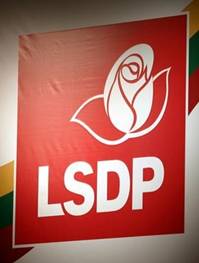
Lithuania’s opposition, the Social Democratic Party, leads in opinion polls three months before the general election, according to a survey by Spinter Tyrimai for online news service Delfi.
The Social Democrats received 14.2 percent support in a survey conducted June 15-22, Delfi said on its website. Two other opposition parties, the Labor Party and Order & Justice, ranked second and third with 13.3 percent and 11.2 percent, respectively. Prime Minister Andrius Kubilius’ Homeland Union placed fourth with 8.5 percent support, the survey showed.
The poll of 1,008 eligible voters, had a margin of error of 3.1 percentage points. Lithuania will hold the general election on Oct. 14.
(Bloomberg)
- Bookmark :
- Digg
- del.icio.us
- Stumbleupon
- Redit it
Voters see social democrat Algirdas Butkevičius as best candidate for Lithuania’s prime minister
- Posted by - (0) Comment
![]()
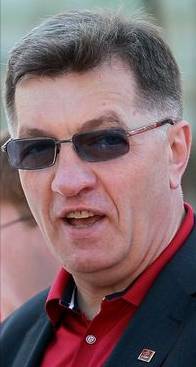
Algirdas Butkevičius
Picture: Irmanto Gelūno/15min.
About one sixth of Lithuanian voters see Algirdas Butkevičius, leader of the opposition Social Democrats, as the best candidate for the post of prime minister, shows a poll published in delfi.lt.
Some 16.1 percent of respondents said Butkevičius was best suited for the position, ousting the long-time favorite Irena Degutienė of the ruling Homeland Union – Lithuanian Christian Democrats (conservatives) from the top of the list. According to the poll carried out by Spinter Tyrimai (Spinter Surveys) in June, Labor Party's chairman Viktor Uspaskich headed the list in April.
In the June survey, 16.1 percent said Butkevičius would best fill the PM post, while Degutienė and Uspaskich were supported for the position by 15.7 percent and 14.4 percent of those polled, respectively. In May, Degutienė enjoyed support of 15.9 percent, Butkevičius 14.5 percent, and Uspaskich 13.3 percent.
- Bookmark :
- Digg
- del.icio.us
- Stumbleupon
- Redit it
- Posted by - (0) Comment

The passenger traffic at Vilnius International Airport (VIA) has shown a steady upward trend since the previous year, and the result of June this year was the best throughout all years of the airport’s operation.
In June 2012, the airport handled 228.6 thousand passengers, which surpassed the result of June 2011 by 23%. Until now, the best monthly result was achieved in August 2008, when the number of passengers soared to 224.6 thousand. 2,775 flights were operated in the first summer month, showing a 7% growth.
The growth in regular flights accounted for 25%, while charter flights witnessed a 15% increase. The most popular June destinations were London, Frankfurt, Riga, Antalya, Copenhagen and Moscow.
971 thousand passengers were handled in six months this year, showing a 36% growth in passenger numbers compared to the same period in 2011.
“The successful results of the first half of the year reached the peak on 15 June, when Vilnius Airport beat the record of the passengers handled in one day: 4,498 passengers departed from Vilnius Airport and 4,530 passengers arrived at Vilnius Airport, totalling 9,028 passengers handled by the airport,” Tomas Vaišvila, VIA Managing Director, commented the results. “Most passengers arrived from Riga – 371, while the number of departing passengers was the highest on London route – 490. A large part of passengers – 1834 – travelled to holiday destinations – Sicily, Cyprus, Turkey, and Greece.”
Until now, the highest number of passengers handled in one day was 8,682 passengers on 17 August 2008.
In 2007 Vilnius Airport handled 1,717 million passengers, 2,048 million in 2008, 1,308 million in 2009, 1,373 million in 2010, and 1,715 million in 2011. It is expected to reach a 25% growth in passenger traffic in 2012. 20 airlines operate regular flights from Vilnius Airport on as many as 39 direct routes.
- Bookmark :
- Digg
- del.icio.us
- Stumbleupon
- Redit it
- Posted by - (0) Comment

Lithuania‘s economic growth in 2013 will be the highest in the region – 3,5 percent, according to the World Bank’s latest EU11 Regular Economic Report. Average economic growth in the EU11 countries is estimated to reach 2,5 percent.
The best performances are expected from Lithuania, Poland (3,2 percent), Slovakia (3,1 percent) and Estonia (3 percent). Latvia is projected to rank fifth with GDP growth of 2,9 percent.
The World Bank is expecting economic stagnation or a downturn in most of the 11 countries of Central Europe. GDP will shrink by 0,4 – 1,2 percent in Hungary, Slovenia, and Croatia, which aims to become an EU member.
Managing Director of “Invest Lithuania” Milda Darguzaite emphasizes the strong impact of successful fiscal reforms on growth. “Lithuania’s GDP growth is driven primarily by increasing domestic demand. Growing exports and investment, mainly into real estate, machinery and other equipment, is another accelerator of economic growth,” Darguzaite said.
According to the World Bank, Poland’s GDP will increase by 2,9 percent in 2012, the highest in the region. In Latvia and Lithuania, heavily affected by the economic crisis, GDP will rise by 2,3 percent. The World Bank forecasts 1,5 percent growth for the EU11 this year.
- Bookmark :
- Digg
- del.icio.us
- Stumbleupon
- Redit it
![]()

The global economy will expand 2.5% in 2012, according to the World Bank. It has significantly revised down its previous 3.6% outlook. Similarly, the global GDP growth outlook for 2013 has been reduced as well – from 3.6% to 3.1%.
GDPs in developing countries are expected to grow 5.4%, instead of 6.2% as projected earlier. Emerging economies will in turn expand only 2.4%.
It is expected that in 2012 world trade will grow 4.7%, not 6.6% as forecast before, World Bank says in its official statement.
The Bank points at the eurozone crisis and the global financial system’s vulnerability as the major risks the world will face this year.
Ref: 102.105.105.834
- Bookmark :
- Digg
- del.icio.us
- Stumbleupon
- Redit it
- Posted by - (0) Comment
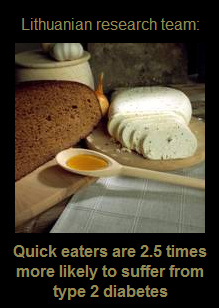
Your parents must have told you a thousand times - don't eat so fast, slow down! Now it appears that scientific research is backing them up. At the recent joint International Congress of Endocrinology and European Congress of Endocrinology in Florence, Italy, a research team from Lithuania presented their research showing that people who eat their food quickly are 2.5 times more likely to suffer from type 2 diabetes than those who take their time during meals.
The research team led by Dr Lina Radzeviciene from the Lithuanian University of Health Sciences scientifically determined for the first time the role that eating speed has as an independent risk factor for type 2 diabetes.
Diabetes mellitus is a very common disorder caused by high levels of sugar in the bloodstream. It affects approximately 6.4% (285 million) of the worldwide population and is associated with an increased risk of heart attacks, stroke and damage to the eyes, feet and kidneys.
Europe alone counts more than 25 million people with diabetes. In most countries, diabetes is now one of the leading causes of death through its effects on cardiovascular disease: 70% to 80% of people with diabetes die of cardiovascular disease. Diabetes is ranked among the leading causes of blindness, renal failure and lower limb amputation, and type 2 diabetes represents between 85% and 95% of cases of diabetes. The total cost of caring for people with diabetes in Europe is estimated between EUR 28 billion and EUR 53 billion per year.
Dr Lina Radzeviciene commented: 'The prevalence of type 2 diabetes is increasing globally and becoming a world pandemic. It appears to involve interaction between susceptible genetic backgrounds and environmental factors. It's important to identify modifiable risk factors that may help people reduce their chances of developing the disease.'
This is not the first time that Dr Radzeviciene's team made a breakthrough in the area of diabetes research. They previously found that coffee consumption (four or more cups a day) significantly decreased the risk of developing type 2 diabetes. They also found that smoking and egg consumption (more than five eggs a week) increased the risk.
- Bookmark :
- Digg
- del.icio.us
- Stumbleupon
- Redit it
- Posted by - (0) Comment
![]()
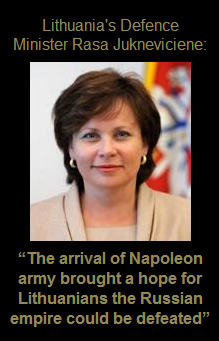
A stubby Napoleon Bonaparte waves his characteristic bicorne hat in an impassioned signal to hundreds of troops, launching a rerun of France's failed invasion of Russia two centuries ago, writes LETA.
"Vive la France, vive la Pologne," cries the French emperor on horseback to the enthusiastic cheers of hundreds of troops decked out in 19th-century military garb.
The emperor and his troops were poised for action Saturday on the banks of the river Neman in Kaunas, central Lithuania: more than a thousand history buffs re-enacting Bonaparte's June 24, 1812 assault on Tsarist Russia.
This time around they were under the command of Oleg Sokolov, a professor in Paris at the Sorbonne University.
"Events like this are my life," Sokolov, who is Russian, told AFP, resplendent in a division general's dark blue uniform with a red stripe and golden epaulettes.
"Recreating a battle with cannons, horses and sabres is much more serious stuff than theatre or a movie," Lithuanian history enthusiast Arvydas Pociunas, the Tsarist Russian chief-of-staff for the day, told AFP. "You must keep a sharp eye out every second," he explained.
The spectacular re-enactment drew more than 1,000 participants from France, Russia and across the region, including Lithuania, Poland, Belarus, Latvia, Ukraine and the Czech Republic, organisers said.
The original crossing of the river Nemunas in Lithuania was Napoleon's first step on what in the end was a doomed march through western Russia. For Lithuania the French general's arrival raised hopes that it could break free from imperial Russia.
"The arrival of Napoleon army brought a real and tangible hope for Lithuanians the Russian empire could be defeated", Lithuania's Defence Minister Rasa Jukneviciene said in a welcoming address ahead of Saturday's re-enactment.
"By losing the battle in Russia, the emperor rushed back to France – and with him went Lithuania's unfulfilled hopes to restore its lost independence with the help of France", she added.

- Bookmark :
- Digg
- del.icio.us
- Stumbleupon
- Redit it
- Posted by - (0) Comment
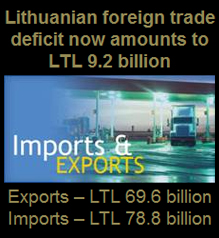
Statistics Lithuania informs that, based on the final data obtained from customs declarations, VAT returns and Intrastat reporting data, exports in 2011 amounted to LTL 69.6 billion, imports – LTL 78.8 billion.
Exports of goods of Lithuanian origin amounted to LTL 45.9 billion. Foreign trade deficit of Lithuania amounted to LTL 9.2 billion.
In 2011, against 2010, exports and imports grew by 28.8 and 29.3% respectively. Mineral products excluded, exports and imports grew by 25.4 and 27.3% respectively. An increase in exports was influenced by an increase in exports of petroleum products – by 39.8%, ground vehicles – 42.8%, fertilisers – 61.1%. An increase in imports was influenced by an increase in imports of crude petroleum – by 27.6%, ground vehicles – 54.3%, boilers, machinery and mechanical appliances, parts thereof – 34.4%.
In 2011, the most important partners in exports were Russia (16.6%), Latvia (10.2%), Germany (9.3%), and Poland (6.9%), in imports – Russia (32.1%), Germany (10%), Poland (9.1%), and Latvia (6.6%).
In 2011, the largest share in exports and imports fell within mineral products (25.5 and 34.3% respectively), machinery and mechanical appliances, electrical equipment (10.4 and 12.3%), products of the chemical or allied industries (9.2 and 10.3%).
In 2011, against 2010, exports of goods of Lithuanian origin increased by 25.1%, mineral products excluded – 20.5%. The increase in exports of goods of Lithuanian origin was influenced by an increase in exports of petroleum products – by 35.5%, fertilisers – 63.4%, furniture – 21.4%, plastics and articles thereof – 18.8%, wood and wood products – 24.8%.
As for exports of goods of Lithuanian origin, the largest share in exports fell within mineral products (36.1%), products of the chemical or allied industries (8.8%), miscellaneous manufactured articles (7.3%), and plastics and articles thereof (7.1%).
Most goods of Lithuanian origin were exported to Germany (12.3%), the Netherlands (8.9%), Latvia (8.5%), Poland (7.2%), Estonia (7%), and France (5.8%).
Table 1. Foreign trade balance, LTL million
| Exports | Imports | Balance | |
| 2010 | 54038.8 | 60952.8 | -6914.0 |
| I quarter | 10519.1 | 12046.0 | -1526.9 |
| II quarter | 13090.8 | 14609.8 | -1519.0 |
| III quarter | 14405.3 | 16486.4 | -2081.1 |
| IV quarter | 16023.6 | 17810.6 | -1787.0 |
| 2011 | 69576.8 | 78812.2 | -9235.4 |
| January | 4964.7 | 5749.0 | -784.3 |
| February | 5158.7 | 5872.9 | -714.2 |
| March | 5674.3 | 6555.5 | -881.2 |
| I quarter | 15797.7 | 18177.3 | -2379.6 |
| April | 5193.8 | 6280.6 | -1086.8 |
| May | 6122.7 | 6890.5 | -767.8 |
| June | 6068.8 | 6716.7 | -647.9 |
| II quarter | 17385.4 | 19887.9 | -2502.5 |
| July | 5716.1 | 6381.6 | -665.5 |
| August | 6026.3 | 6800.3 | -774.0 |
| September | 6341.7 | 7096.9 | -755.2 |
| III quarter | 18084.1 | 20278.8 | -2194.7 |
| October | 6094.0 | 6954.8 | -860.8 |
| November | 6196.0 | 7035.4 | -839.4 |
| December | 6019.8 | 6478.1 | -458.3 |
| IV quarter | 18309.7 | 20468.2 | -2158.5 |
- Bookmark :
- Digg
- del.icio.us
- Stumbleupon
- Redit it
Weekly “Veidas” names richest people in Lithuania
- Posted by - (0) Comment
![]() Lithuanian weekly magazine “Veidas” has published the 8th list of the richest Lithuanians.
Lithuanian weekly magazine “Veidas” has published the 8th list of the richest Lithuanians.
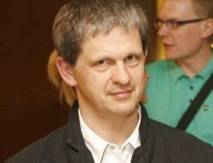
Nerijus Numavicius.
At the moment, not having even a close rival, the richest person in the country is Nerijus Numavicius, holding 60% of Vilniaus Prekyba (VP) Group shares.
Counting directly or indirectly managed companies, Numavicius has around 60% shares in all companies constituting the large VP Group, including NDX Energy which is outside the Group. The total holding, according to the financial reports for 2011, is worth around LTL 5.9 billion (EUR 1.7 billion). The most valuable company of the Group isMaxima Group (worth LTL 3.8 billion/EUR 1.1 billion), the Vilnius-basedAkropolis shopping mall alone is worth approximately LTL 1 billion (EUR 290 million), writes LETA/ELTA,
Second on the list of the richest in Lithuania are Lyda Lubiene, widow of long-term Achema head Bronislovas Lubys, and his daughters Viktorija Lubyte and Jurate Zadeikienewho together have Achema shares worth LTL 930 million (EUR 270 million).
Zilvinas Marcinkevicius with 14% of VP Group shares (worth LTL 815 million/EUR 236 million) came third on the list.
Source: http://www.baltic-course.com
- Bookmark :
- Digg
- del.icio.us
- Stumbleupon
- Redit it
VilNews e-magazine is published in Vilnius, Lithuania. Editor-in-Chief: Mr. Aage Myhre. Inquires to the editors: editor@VilNews.com.
Code of Ethics: See Section 2 – about VilNews. VilNews is not responsible for content on external links/web pages.
HOW TO ADVERTISE IN VILNEWS.
All content is copyrighted © 2011. UAB ‘VilNews’.

 Click on the buttons to open and read each of VilNews' 18 sub-sections
Click on the buttons to open and read each of VilNews' 18 sub-sections 















.jpg)



